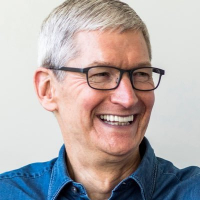
I do it for a reason.
What distinguishes Apple, Microsoft, Amazon, Google, and Facebook isn’t their managements’ “ruthlessness.” It’s their heavy investment, over many years, in cloud computing centers.
Even early in the 2010s, it took $1 billion of capital each quarter to get into the cloud market. That has only increased with time. Now it averages $4 billion each quarter.
The money must come from somewhere. Cloud is a capital-intensive business. If you’re handing out dividends, it’s because you don’t know what else to do with the shareholders’ cash.

Everyone else fell away.
Just as investment requirements are constantly increasing, so is complexity.
I have re-written my book about Moore’s Law twice in the last decade. Each time I focused on Intel. As important as Moore’s Law may be, Moore’s Second Law is even more important. Moore’s Second Law holds that, as chip complexity increases, so does the investment needed to make a chip. That’s why there are only four companies scaling the production of general-purpose microprocessors today – Intel, Taiwan Semiconductor, Samsung, and Global Foundries. Everyone else is “fabless.” Nvidia and AMD need other companies to produce their chips. They just design them.

This made me realize that there is a third dimension to Moore’s Law, just as important as Moore’s Second Law.
Let’s call it Moore’s Third Law. Change is constantly accelerating, and it can be managed only at the center.
This means that no company is safe, not even Intel, the company Gordon Moore co-founded. Management requirements increase exponentially with Moore’s Law, and everything it touches. And management must be centralized in the hands of one person in order to react.
Intel failed because it thought it was a mature company in 1998. When Andy Grove retired, it passed the torch to corporate politicians, to marketing and then finance people. It’s why Intel failed in mobile during the 2000s, and why it eventually failed to even keep up with Moore’s Law.

I’m a great believer in democracy. I believe in one man one vote, in one share one vote. But the best tech companies can’t run that way. They can’t be political. In order to focus they must have one person at the top, who has total power. They must be Empires.
This, as much as their investments in cloud, are what distinguish the Cloud Czars. Each is led by an engineer-entrepreneur. Each has someone at the top with total power, but who must earn that power every year against their peers, and against upstarts in the market.
Today the Cloud Czars rule supreme. But in March 2001, the 5 largest companies by market cap were, in order, General Electric, Microsoft, Exxon Mobil, Pfizer, and Citigroup.
Uneasy lies the head that wears the crown.

Look at that list again. General Electric had a system for choosing leaders that worked for over a century. Then, six months after leading the pack, that system coughed up Jeff Immelt. Today GE is worth barely one-tenth what it was. IBM was number 11 on that 2001 list. Then it coughed up Virginia Rometty. Today, while the Cloud Czars have gone to glory, IBM is worth less than 1/10th what they are. Even mighty Intel eventually coughed up Brian Krzanich. A complete failure, as an executive and as a human being, he tossed out a generation of leaders to rule and ran Intel into the ground.
Even entrepreneurs screw up. The history of technology is littered with leaders destroyed by their own hubris. Lewis Platt of Hewlett-Packard turned that great engineering company into a staid and self-destructive PC company. Ken Olsen of Digital Equipment missed the PC revolution. An Wang of Wang Labs. The list goes on.
Government can’t fix this. Government can’t change this. Government can only muck this up. Government tried to control AT&T, IBM, and Microsoft. Microsoft returned to power as a Cloud Czar only after it got government off its back. Government only accelerates the fall of Empires.

The only way to control empires, and empire builders, is through the market. This seems to contradict what I just wrote, because Wall Street is supposed to be the market.
Only it isn’t anymore. Tech rules the market. Visa is worth more than JPMorgan Chase. Trading is done through transaction processing servers. Fintechs are nothing more than cloud-based alternatives to this, lower-cost options that replace both people and machines.
Everything today is tech. Everything is the tech market.

America’s genius has been in allowing this natural process to play out. We demand that the market discipline corporate leaders. We let them fall as well as watch them rise. Our economy is large enough so that we don’t worry where these people come from, or even where market leaders are based.
This is how it must be. The real challenge for policymakers in the age of the cloud is to let economic nature take its course.









